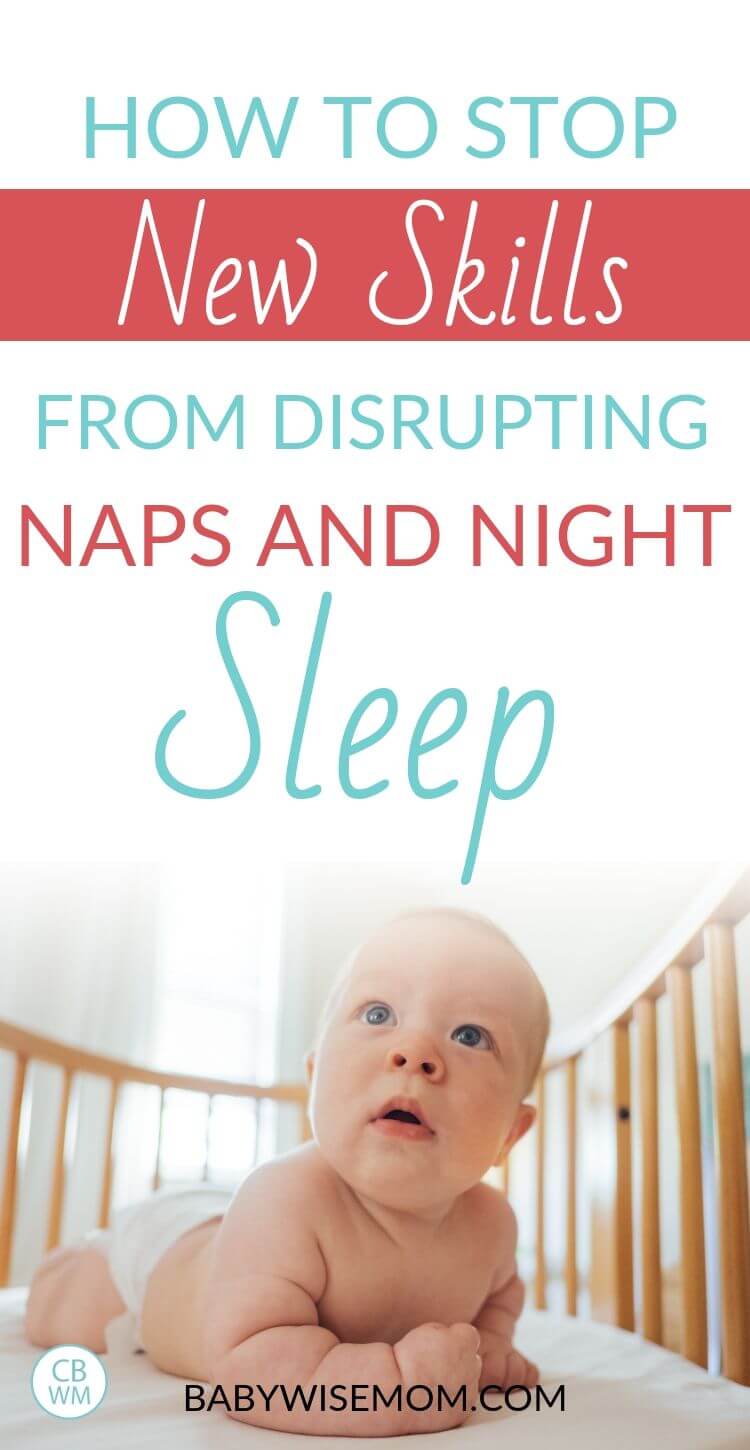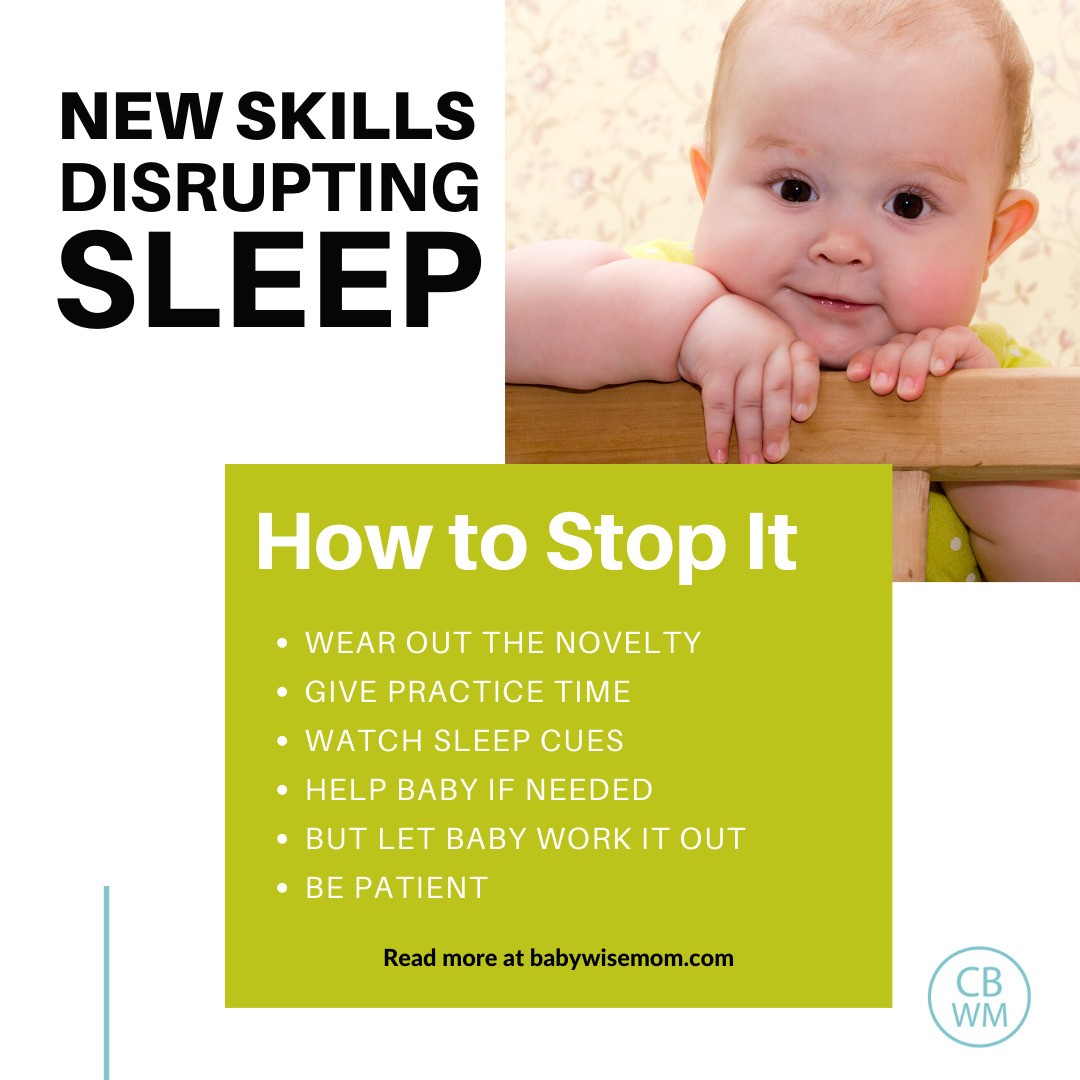When your baby or toddler learns a new skill, chances are sleep will be disrupted in some way. Read this post for tips on how to prevent that and get baby through it quickly.

When your baby learns a new skill, it is initially very exciting! Your baby rolled over! Your baby is surely a genius and no baby has possibly rolled over as well as your baby just did (nor been half as cute). Break out the camera and post to social media ASAP!
Am I right?
Then reality hits.
The new skill is cool, yes. The problem is baby thinks so, too.
So baby, who has probably previously been quite the good sleeper, starts wanting to do this new skill at all times, including in bed. Instead of sleep.
The problem comes when baby has the ability to get into the new skill, but not out of the new skill. For example, baby can roll from back to tummy but not from tummy to back.
So baby rolls and then starts crying because he is frustrated that he is stuck on his tummy and he is used to sleeping on his back. Or maybe baby learns to stand up, but doesn’t know how to sit back down. He gets a thrill out of standing but then grasps to the side of the crib in fear because he can’t get back down.
Sometimes these disruptions can come not because a new skill is a challenge in some way. Sometimes your baby is just so excited about it that he wants to keep practicing during naps.
New skills that disrupt sleep aren’t just gross motor skills, either. They can be something as simple as babbling. Then baby practices his new skill long enough that he becomes overly tired and has a hard time falling asleep because his waketime length has become too long.
I have some good news…
This is normal!
All babies have disrupted sleep at some point because of a new skill being learned.
I have four children and have experienced a sleep disruption brought on by new skills with each one of them–though different children have had disruptions with different skills (not all of them were disrupted by rolling, not all were disrupted by standing, etc.).
Rest assured your baby is normal and will get past this hurdle. Your baby will go back to sleeping as usual–you just have to be sure you don’t reinforce any new habits you don’t want to continue! Let’s talk this through.
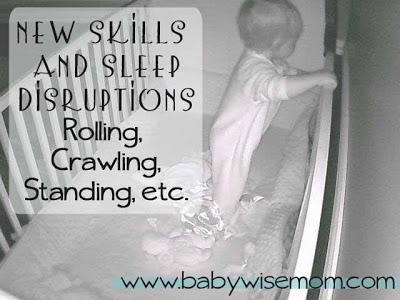
Post Contents
- HOW LONG WILL THE SLEEP DISRUPTION LAST?
- DO THESE THINGS
- 1-Wear Out the Novelty
- 2-Give Practice Time Because Practice Makes Perfect
- 3-Give it Time and Be Patient
- 4-Watch Sleep Cues
- 5-Help If Needed
- DO NOT DO THESE THINGS
- 1-Do Not Stress
- 2-Do Not Turn This Into a Social Hour
- 3-Do Not Intervene More Than Needed
- 4-Do Not Be Afraid of the New Skill
- 5-Do Not Ignore Other Possible Culprits for Poor Sleep
- Conclusion
- Related Posts
HOW LONG WILL THE SLEEP DISRUPTION LAST?
It is impossible to give an exact timeline. I will say that it has never been an extended length of time for any of my children with any one skill. Follow the suggestions below and my guess would be it will be less than a week.
If you reinforce behavior that you don’t want to happen, it will last longer than that.
DO THESE THINGS
While it is normal and even inevitable, there are things you can do to help speed up your baby getting past this disruption.
1-Wear Out the Novelty
Allow your baby plenty of opportunities to practice this skill in the day during waketime. If your baby is obsessed with rolling, make sure he gets plenty of time to roll during playtime during the day. Make it your first priority.
Once your baby is accustomed to this new skill, he won’t feel such a driving need to continue this practice during nap time.
You might need to move some skill practice time into the crib, especially for those who have sleep disruptions associated with standing in the crib.
2-Give Practice Time Because Practice Makes Perfect
Address the issue of your baby being able to get out of the situations he is getting into. When Brayden first started standing in the crib, he had a hard time getting back down.
He was 7-8 months old when he started standing. Brinley, conversely, was about 10 months old.
A ten month old is better at problem-solving than a seven month old.
Brayden’s disruption lasted longer than Brinley’s simply because he needed more guidance and help in figuring out how to get back down. Brinley was old enough to figure it out herself while Brayden needed to practice in his crib during playtime.
There actually are things you can do to help encourage your baby to figure out how to do certain skills. To get baby to roll over, put a toy just out of reach. To get baby to roll from tummy to back, arc a toy from the ground over baby’s head slowly so baby will follow it–his head is heavy and will help propel him over (just do it on soft ground).
You do not have to just give it time (though time is needed…see the next tip). You can be proactive in helping your little one practice.
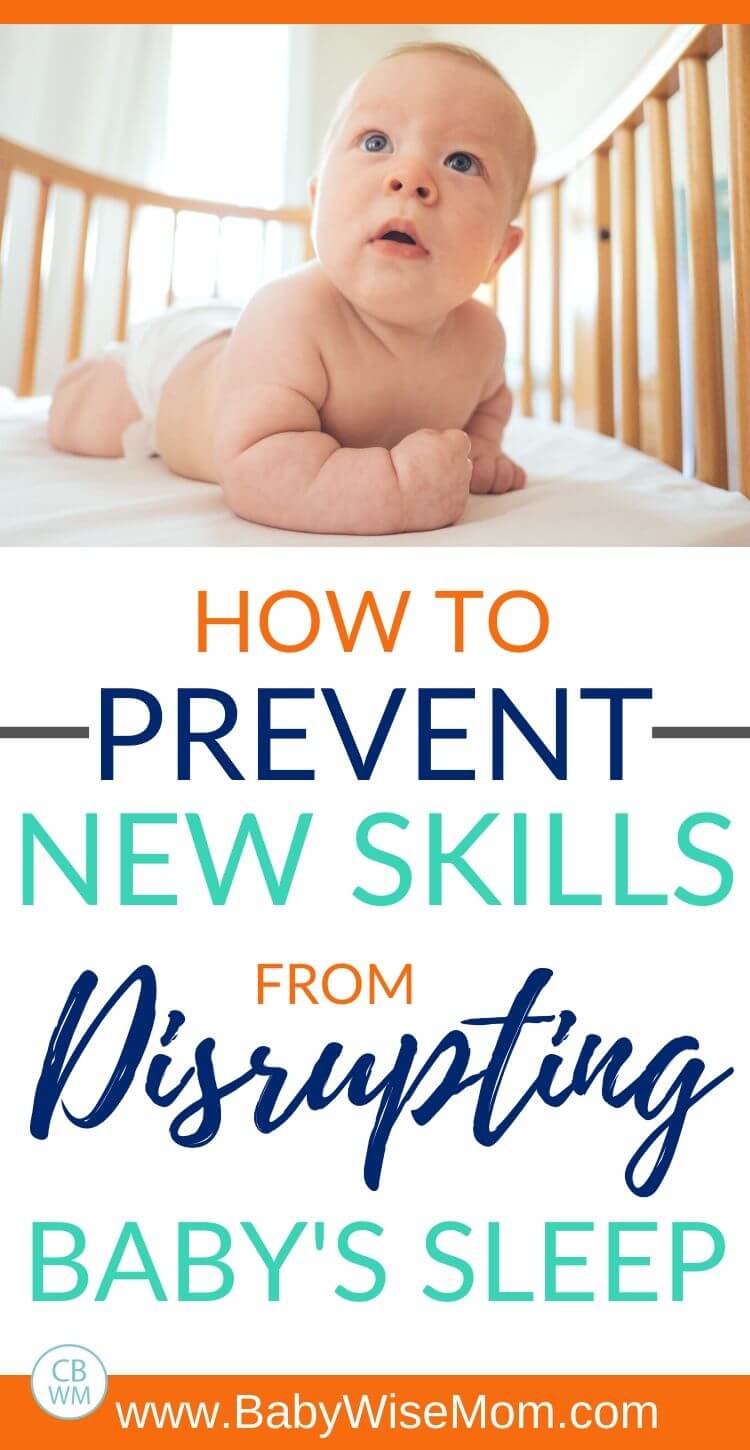
3-Give it Time and Be Patient
In this practice, you are also helping the baby to build the muscle needed to do the skill. Relate it to yourself. Go ahead and do as many push-ups as you can. Ready—go.
Now, say I told you in order to get into a comfortable position for sleep, you needed to double that number. You would need some time to work on this skill to build your muscle to be able to do twice as many push-ups.
Your baby needs to build muscles just like we do, in order to do physical things. Babies seem to do so much faster than we do, so don’t be discouraged by that. 🙂
And keep in mind, the length of time you need to be patient will vary a lot. I think age is a huge contributor. As I said, Brayden was about 7-8 months when he started standing in the crib. We had two days of big disruptions. Kaitlyn was 12 months when she started and we had only one nap of disruptions.
4-Watch Sleep Cues
Because your baby is taking longer to fall asleep, he might wake up early from the nap (though some babies naturally adjust and sleep later–go ahead and let baby get an extra thirty minutes in if you are fortunate enough to have such a baby).
Since baby is not napping as well, he might need to go down for the next nap or bedtime a bit earlier than usual.
5-Help If Needed
Sometimes babies will get themselves into a position they need help out of. That is okay! With all four of my children, I have had to go in at some point to help someone roll back over, lay back down from sitting, or get back down from standing…you can help your baby.
But I always give the baby about five minutes to work it out on his own before I jump in there. In that five minutes, baby is at the least working the muscles as baby tries to do it.
So give baby a chance to do it alone, and if he can’t, go ahead and help. Just be sure you don’t fall into the traps listed below…
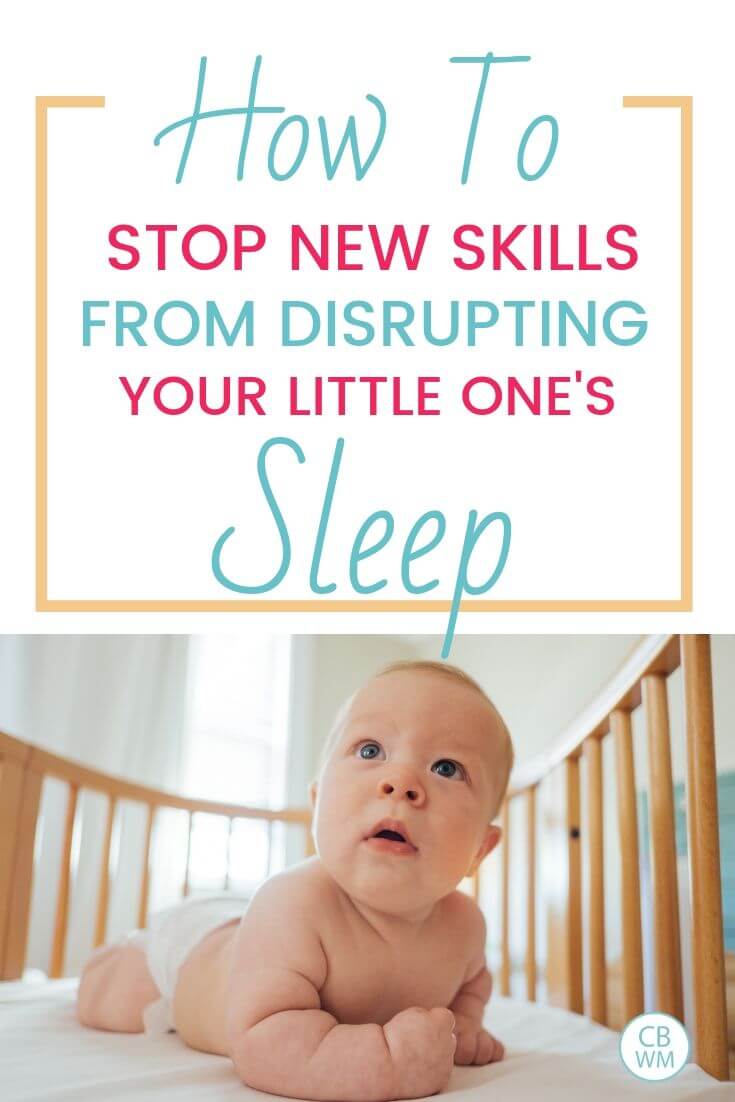
DO NOT DO THESE THINGS
There are some things to avoid so you don’t fall into a trap of “accidental parenting” (starting habits you didn’t intend to start).
For whatever solution you are thinking of doing to help this disruption, think it through several months and see if it would create more problems in the future. Some people start nursing to sleep and then a month later realize baby won’t go to sleep unless he is being nursed.
Do not start regularly doing anything you do not want to continue long-term.
Read: Common Parenting Mistakes that Cause Sleep Problems
1-Do Not Stress
Remember, this is normal. I know it can be stressful when your baby isn’t sleeping. Do the first four steps I have listed above, and then try not to stress about how your baby is taking a long time to fall asleep.
2-Do Not Turn This Into a Social Hour
When you do need to go in to help out, don’t turn it into a social call. I seriously make myself like another object in the room when I go in baby’s room. I am not happy, mad, amused, or annoyed. I do not make eye contact. I don’t talk.
I just gently help baby and then leave the room again.
Sometimes the baby will cry when you walk out. No surprise! You have just walked in and left again without taking him with you. But he needs to sleep. None of my babies have cried for an extended period of time after I left. Let baby be and within five minutes, he will likely be quiet.
3-Do Not Intervene More Than Needed
Yes, you can help as needed, but don’t jump in there more often than needed or sooner than needed. Give baby some time to figure it out on his own before you “rescue.” The day will come when baby can do it alone–you want to give baby that chance to develop that skill.
During practice time during regular playtime, follow the same rule. Don’t move baby from his tummy to his back at the first whimper. Let him try to figure it out!
Some babies do need some cry it out (CIO) to be able to learn to do it alone. Use your best judgment here depending on the skill being learned–I wouldn’t do CIO with a child standing in a crib (though I would be fine waiting a few minutes to see if the baby could get back down on his own before going in). For a baby on his tummy and upset, I feel fine with some CIO. If a baby is persistent about being on the tummy, I figure he is then going to have to learn to either flip back over or to sleep on his tummy.
4-Do Not Be Afraid of the New Skill
Don’t be afraid of the new skill. I actually took the initiative and taught Brinley to stand up in her crib and how to sit down. Instead of waiting for her to figure out how to stand up and then teaching her how to sit, I just taught her how all at once. Standing was never a big disruption for her. Yes, once she learned how, she had a few naps where standing was a pre-sleep party, but it was never a huge disruption to her overall sleep.
5-Do Not Ignore Other Possible Culprits for Poor Sleep
Most of the time, these disruptions are happening simply because of a new skill. Sometimes, however, you have something else contributing to the sleep disruption.
Sometimes your baby will be old enough and ready to stay awake longer, but you have the same old waketime length. Then he gets in bed, isn’t tired, and starts practicing his skills instead of sleeping. So sometimes adjusting the waketime length will help baby just go right to sleep.
Conclusion
These dos and don’ts can help you get baby through this sleep disruption and back to taking great naps in a short amount of time. Don’t stress, focus on practice, and let baby work it out independently and your baby will be back to sleeping well rather quickly.
Related Posts
- 10 Reasons your 5-8 Month Old Stopped Sleeping Well
- The First Five Things To Check When Your Baby Is Taking Short Naps
- Sleep Disruptions You Will Face as a Babywise Mom
